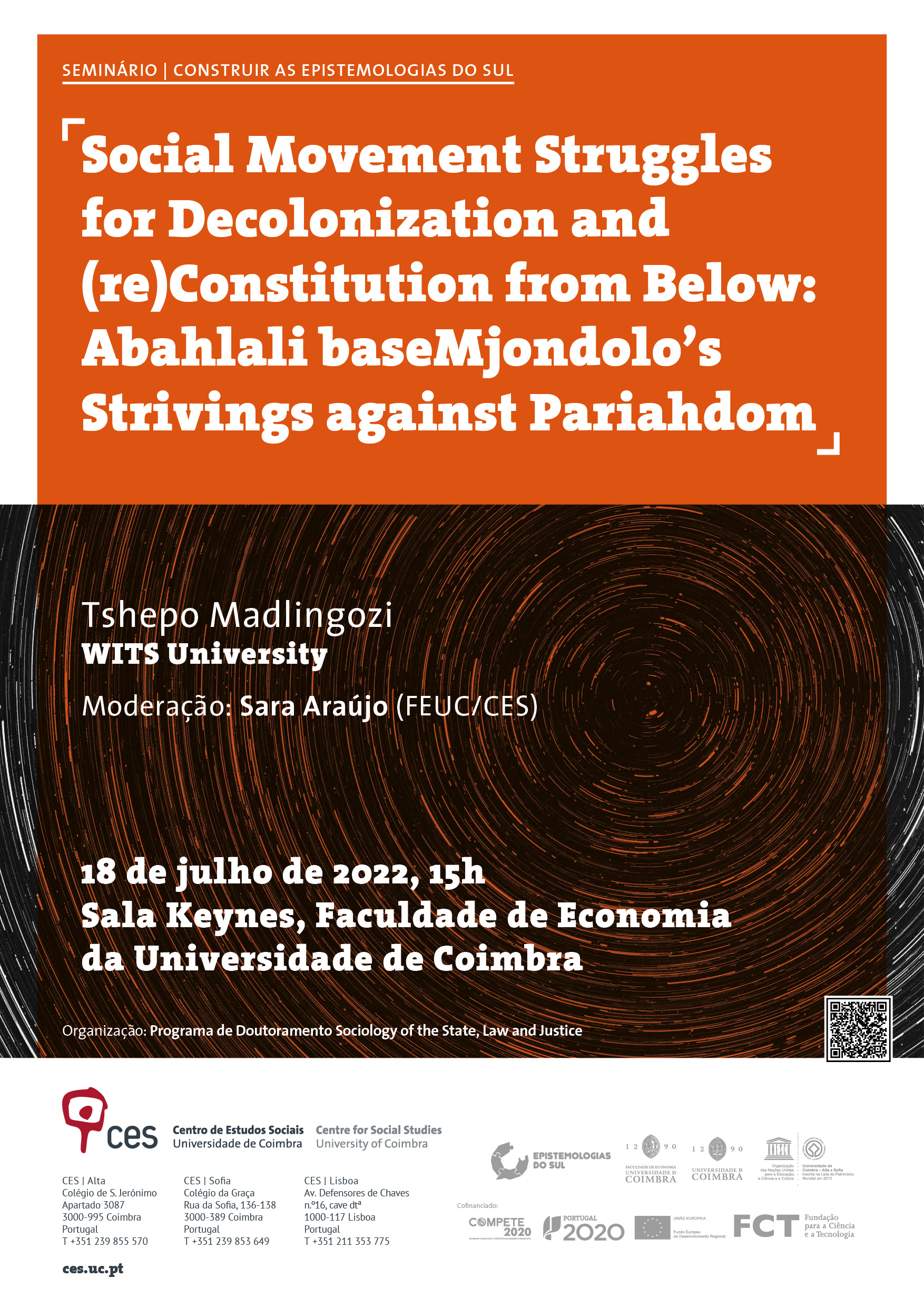Seminário
Social Movement Struggles for Decolonization and (re)Constitution from Below: Abahlali baseMjondolo’s Strivings against Pariahdom
Tshepo Madlingozi (WITS University)
18 de julho de 2022, 15h00
Sala Gonçalves da Silva, Faculdade de Economia da UC
Moderação: Sara Araújo (FEUC/CES)
Apresentação
For better and for worse, the ‘decolonial turn’ has made its mark on almost all disciplines, sub-disciplines, and focus areas of the social sciences. However, while most scholars are agreed that ‘decolonization is not a metaphor’ (Tuck & Young, 2012), most proponents of decoloniality and decolonization often do not identify the constituent powers or movements that can drive or have driven decolonization of society and the state in the contemporary era. Secondly, there is a dearth of scholarship on what we may call ‘everyday strivings for decolonization’; that is, decolonization struggles outside of the epochal and the spectacular. This paper is concerned with how some movements of oppressed and ‘invisibilized’ people engage in everyday struggles for decolonization and (re)constitution. More specifically, it focuses on the historical settler colonial context to show that everyday struggles of some movements of indigenous people, Black people, and other oppressed groups are often ultimately struggles against pariahdom. Pariahdom is a constitutive and foundational settler colonial condition that confines indigenous people, historically enslaved people, non-nationals, and other oppressed people to lived experiences of unhomeliness, homelessness, rootlessness, material impoverishment, and ultimately wordlessness. This paper is part of a global south contribution to social movement scholarship with the aim of demonstrating that in historically settler colonial settings beyond classic claims for recognition and/or distribution many movements are engaged in everyday decolonization struggles against pariahdom. Abahlali baseMjondolo (Shack-dwellers Movement of South Africa) serves as a case study of this paper.
Nota biográfica
Tshepo Madlingozi is the Director of the Centre for Applied Legal Studies at WITS University, and an Associate Professor at the School of Law of the same university where he teaches social justice and human rights. Between 2011 and 2016, he was a member of the core team of Alice project at CES. He holds master’s degrees in both Law and Sociology, and he received his PhD degree from Birkbeck, University of London. He is a Research Associate at the Chair for Critical Studies in Higher Education at Nelson Mandela University, and a Visiting Professor, International Institute of Social Studies of Erasmus University Rotterdam. He is a co-editor of South African Journal on Human Rights. He is a co-editor of Symbol or Substance: Socio-economic Rights in South Africa (Cambridge UP) and a co-editor of Introduction to Law and Legal Skills in South Africa, 2nd Edition (Oxford UP South Africa). He sits on the boards of the following civil society organizations: the Rural Democracy Trust, Mining-Affected Communities United in Action/Women-Affected by Mining Action, and Afrika Ikalafe Spiritual Health Institute. He is also a member of the Steering Committee of the African Coalition for Corporate Accountability (ACCA), and a member of the advisory board of Health Justice Initiative. For thirteen years (2015-2018) he worked with and for Khulumani Support Group, a 120 000-strong social movement of victims and survivors of Apartheid as National Advocacy Coordinator & later the Chairperson.
Organização: Doctoral Programme on Sociology of the State, Law and justice


